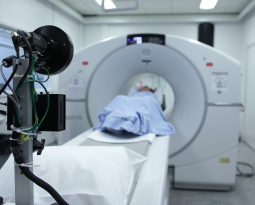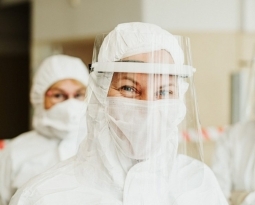South Dakota Patent of the Month – April 2022
Trampoline parks are a source of fun and exercise for many kids and adults alike. Consumer Product Safety Commission (CPSC) standards are in place to protect all users since a trampoline – fun as it may be – can also be dangerous. These trampoline parks are made of a series of trampoline surfaces connected by rigid metal supports. The CPSC just requires frame pads to be placed over any metal surface, cable, chain, hook, or spring used to set up the trampolines. Traditional frame pads have a foam core with a protective cover over it. The foam shrinks over time, just as it does in a couch, and eventually loses its protective characteristics. This shrunken state creates wrinkles in the pad and may require replacement or refilling. This means each pad needs to be untied, refilled, and reinstalled.
Rush Company, Inc. (Rush-Co) has designed new and more reliable frame pads so that people can enjoy trampoline parks with no stress. Rush-Co has been innovators in the manufacture and design of cover systems for over 50 years with experience in agricultural, marine, and wind applications in addition to a range of customized engineered fabrics.
Their frame pads continue to use foam cores but have modified the cover material to increase life span. A cover tightening mechanism is used to pull the protective cover over the foam core and tighten it in place. A traditional pad uses a zipper to close over the foam which can sometimes get stuck, break, or undo. The tightening mechanism in Rush-Co’s design uses clasps and adjustable straps to easily close over the foam and provide the desired tensioning. This design is easier to refill and therefore easier to maintain wrinkle free. The cover itself is made of a vinyl-coated fabric that withstands extensive use over time.
There is plenty of innovation that goes into having fun, and Rush-Co is happy to make sure your safe while you’re at it.
Are you developing new technology for an existing application? Did you know your development work could be eligible for the R&D Tax Credit and you can receive up to 14% back on your expenses? Even if your development isn’t successful your work may still qualify for R&D credits (i.e. you don’t need to have a patent to qualify). To find out more, please contact a Swanson Reed R&D Specialist today or check out our free online eligibility test.
Who We Are:
Swanson Reed is one of the U.S.’ largest Specialist R&D tax advisory firms. We manage all facets of the R&D tax credit program, from claim preparation and audit compliance to claim disputes.
Swanson Reed regularly hosts free webinars and provides free IRS CE and CPE credits for CPAs. For more information please visit us at www.swansonreed.com/webinars or contact your usual Swanson Reed representative.

















